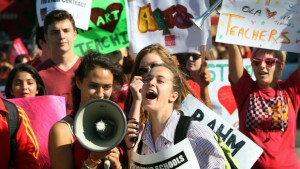
Chicago teachers got the mayor's, and the world's, attention, talking about real educational needs. (Photo courtesy of CTU)
by Lisa Guisbond and Alain Jehlen
A strange thing happened to Rahm Emanuel on his way to trouncing the Chicago Teachers Union: Chicago parents said, “No!”
The factors that led parents to support the union will probably be debated for some time. Here are two big reasons:
- The union proved in word and deed that they were fighting, not just for teachers, but for better education of their students.
- Waves of test-score focused, corporate-model “reform” have swept through Chicago for 20 years without improving the schools, and parents, along with teachers, have had enough.
Emanuel has made little effort to hide his attitude toward the teachers’ union. As soon as he was elected mayor, he hired Rochester, NY, Superintendent Jean-Claude Brizard to be the school system’s CEO. Brizard had just received a 95 percent no-confidence vote from the teachers of Rochester. And Emanuel’s appointed school board, at its first meeting, rescinded a four-percent raise that had been bargained with the union, claiming a financial emergency that turned out to be bogus.
And Emanuel and Brizard went on from there, publicly attacking the union, demanding that teachers work an extra hour a day for free and that future raises be tied to test scores, all in the name of doing right by students.
But Chicagoans didn’t buy it. In a poll last May, 40 percent said they were on the union’s side in its battle with the mayor while 17 percent were with the mayor.
When teachers struck after Labor Day, a new poll showed an amazing two-thirds of public school parents supported the strike – even as they scrambled to find childcare.
The Chicago union leaders come from a rank-and-file caucus formed in 2008 (when the CEO was Arne Duncan, now the U.S. Secretary of Education), which joined with neighborhood groups to fight the school closings that were part of corporate “reform.” When they were elected to lead the union, they put together a comprehensive plan for better schools, including ways to pay for improvements. In both contract demands and public statements, they focused on students’ needs.
Apparently, Chicago parents put more trust in their children’s teachers than in the mayor’s test-and-punish policies.
In that regard, Chicago is the tip of the iceberg. Across the nation, tens of thousands of parents, teachers, students, and school leaders are rising up to resist so-called reforms based on standardized exam misuse. From Texas to Long Island and Washington to Florida, people with first-hand knowledge of the damage being done to academic quality and equity are pushing back. They want out-of-touch politicians and their funders to stop doubling down on strategies that have not worked.
Many parents share teachers’ disgust at what a tsunami of testing has done to their children’s school days. They are concerned about what has been washed away: things like art, music, physical education and recess. They are turning away from policies that blame educators for problems largely caused by the impoverished settings in which their students live and the city’s own misguided policies. In Chicago, 80 percent of students qualify for free or reduced price lunches.
Policies like those of Mayor Emanuel are leading many excellent teachers to flee to the suburbs. Some seek jobs in private schools like the ones Emanuel’s children attend, the elite University of Chicago Lab School.
Several years ago, the Lab School’s director, David Magill, wrote, “Physical education, world languages, libraries and the arts are not frills. They are an essential piece of a well-rounded education.” To his credit, Magill sees what’s going on around him and is dismayed. In a statement on the school’s website, he said, “Measuring outcomes through standardized testing and referring to those results as the evidence of learning and the bottom line is, in my opinion, misguided and, unfortunately, continues to be advocated under a new name and supported by the current [Obama] administration.”
Mayor Emanuel can’t say nobody told him. In March, researchers from 16 universities around Chicago sent him an open letter, saying, “The new evaluation system for teachers and principals centers on misconceptions about student growth, with potentially negative impact on the education of Chicago’s children.”
The growing opposition to the testing regime cuts across regional and ideological lines. It includes parents, teachers, students, principals, community and elected leaders.
FairTest initiated the National Resolution on High-Stakes Testing as a vehicle for this growing movement. The resolution was cosponsored by the NAACP Legal Defense and Educational Fund, the United Church of Christ Justice and Witness Ministries, and Chicago Parents United for Responsible Education (PURE), among other groups. So far, more than 400 organizations and 12,000 individuals have endorsed it. If you are looking for change, add your name and your voice.
(To watch a fascinating television debate that pits a union leader against the private equity firm chairman who’s one of Mayor Emanuel’s chief supporters, click here.)
[To return to the Backpack, minimize browser.]

